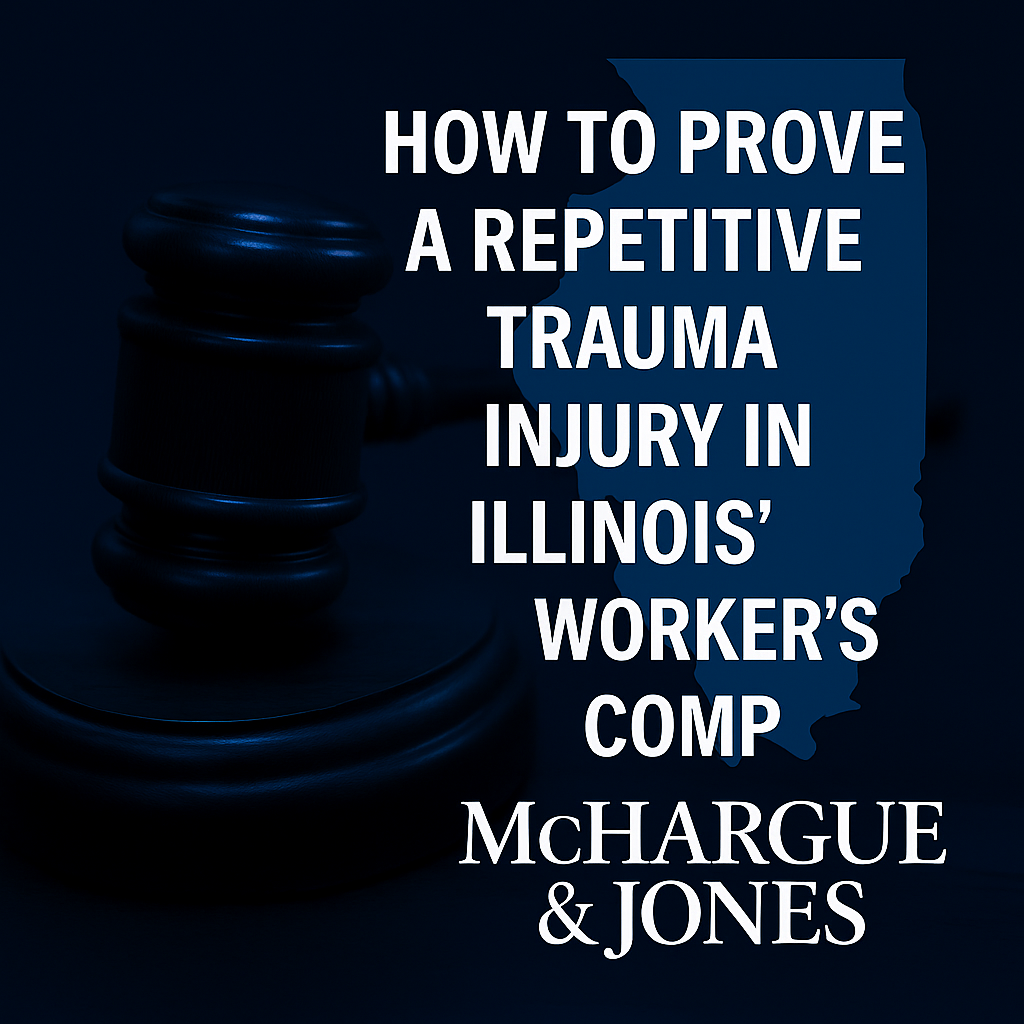How Do You Prove a Repetitive Trauma Injury in Illinois Workers’ Comp?
Repetitive trauma cases — especially involving lifting, squatting, kneeling, bending, twisting, or climbing — are some of the most highly disputed claims at the Illinois Workers’ Compensation Commission.
They often turn into battles of medical causation, pitting your treating orthopedic surgeon or physical medicine doctor against the insurance company’s IME doctor.
This article, written by an experienced workers’ comp lawyer, explains exactly what you must prove, what evidence matters most, and how to strengthen a repetitive trauma claim involving the back, knees, hips, and lower extremities.
What You Must Prove in an Illinois Repetitive Trauma Case
Under Illinois law, you must show:
-
You are an employee covered by the Act.
-
Your job duties were a causative factor in creating or aggravating your condition.
-
You reported and filed the claim on time.
The main battle is usually #2 — causation.
How to Prove Repetitive Trauma: The Evidence That Wins Cases
1. Detailed Job-Duty Descriptions
Describe:
-
Weight lifted
-
Frequency of lifting
-
Squatting, kneeling, climbing
-
Awkward postures in tight spaces
-
Concrete or uneven surfaces
-
Overtime / long shifts
2. Medical Records Showing Progression
-
Symptom onset
-
Imaging (MRI, X-ray)
-
Treatment history
-
Doctor’s causation opinion
3. Consistency Between Your Testimony & Medical History
4. Supporting Statements
-
Coworker descriptions
-
Union safety reports
-
Employer task lists
Real-World Injury Patterns by Occupation
Warehouse Workers
Internal link:
https://mcharguelaw.com/workers-we-represent/warehouse-workers/
Typical conditions:
-
Lumbar strains / disc herniations
-
Knee meniscus tears
-
Hip bursitis
-
Chronic lifting-related pain
- Carpal tunnel
Plumbers / Mechanics
Internal link:
https://www.mcharguelaw.com/chicago-workers-compensation-lawyer/workers-we-represent/plumbers/index.html
Typical conditions:
-
Chronic kneeling → meniscus tears
-
Twisting → low back injury
-
Crouching → hip degeneration
The IME vs. Treating Doctor Fight
Insurers nearly always send workers to an IME who may claim:
-
“Mild degenerative findings only.”
-
“No acute injury.”
-
“Work was not a causative factor.”
Your treating doctor is the key to winning. A strong opinion stating:
-
Your job duties caused or aggravated your condition
-
The mechanism of injury makes medical sense
-
Your restrictions & disability are reasonable
…can completely outweigh an IME.
Internal link:
-
Preexisting Injury Claims
-
Do You Need a WC Attorney?
When Is the “Accident Date” for Repetitive Trauma?
It is usually the date you knew or reasonably should have known your job was causing the problem — often the first doctor visit where causation is discussed.
This affects:
-
Notice deadlines
-
Filing deadlines
-
Average weekly wage
Internal link:
5 Steps to File a Workers’ Comp Claim
https://mcharguelaw.com/workers-compensation/5-steps-to-file-for-workers-comp-in-chicago/
FAQ: Proving Repetitive Trauma in Illinois
Q1: What if my MRI just shows “degeneration”?
You can still win. Illinois compensates aggravations of degenerative conditions.
Q2: Is a treating doctor’s opinion stronger than an IME?
Often yes — arbitrators frequently give more weight to treating physicians.
Q3: Do I need a lawyer to prove repetitive trauma?
It is highly recommended due to the medical-causation disputes involved.
Q4: What injuries are most common with repetitive kneeling?
Meniscus tears, patellar tendinitis, bursitis, and knee degeneration.
Q5: What if my employer says there was no accident?
Repetitive trauma does not require a single accident event.


